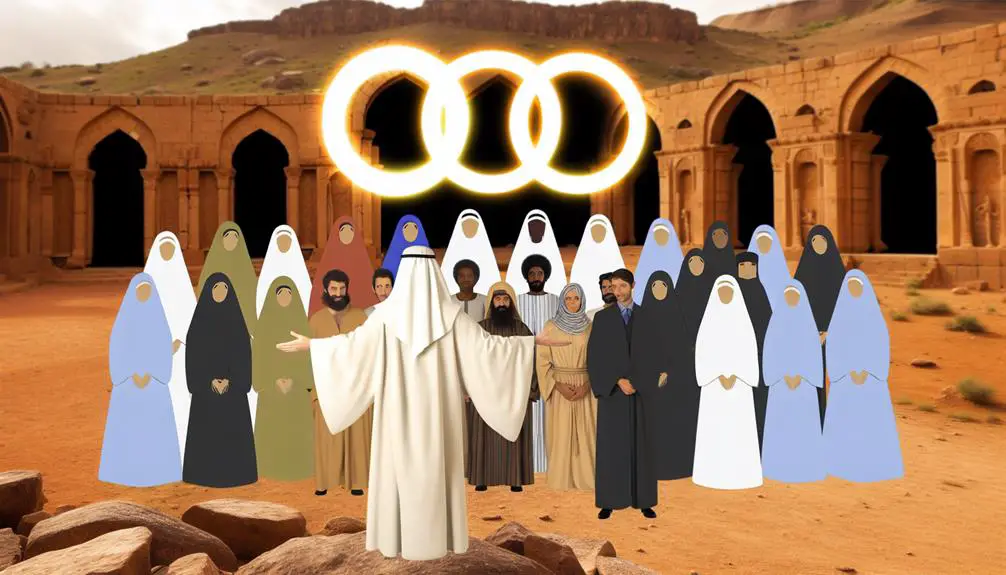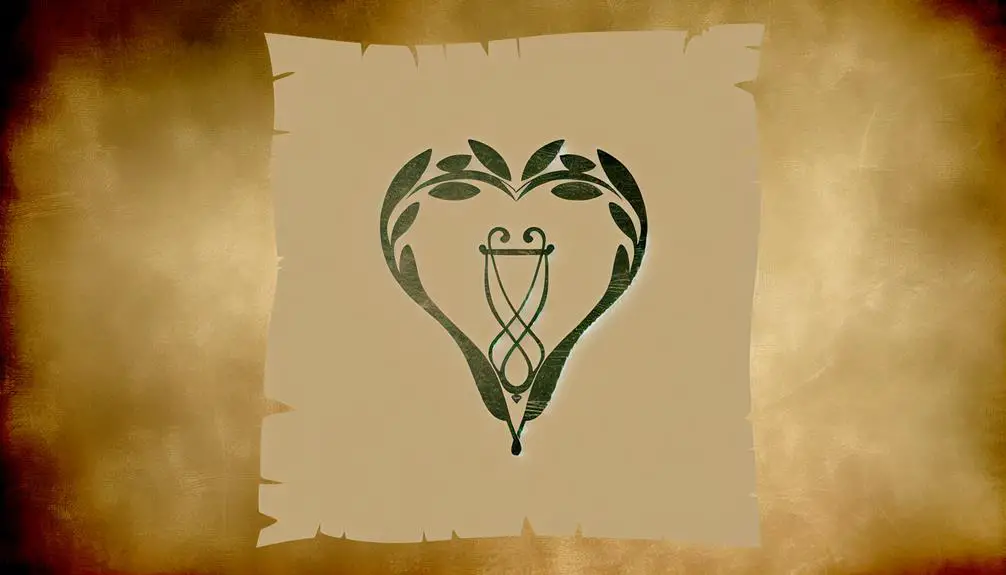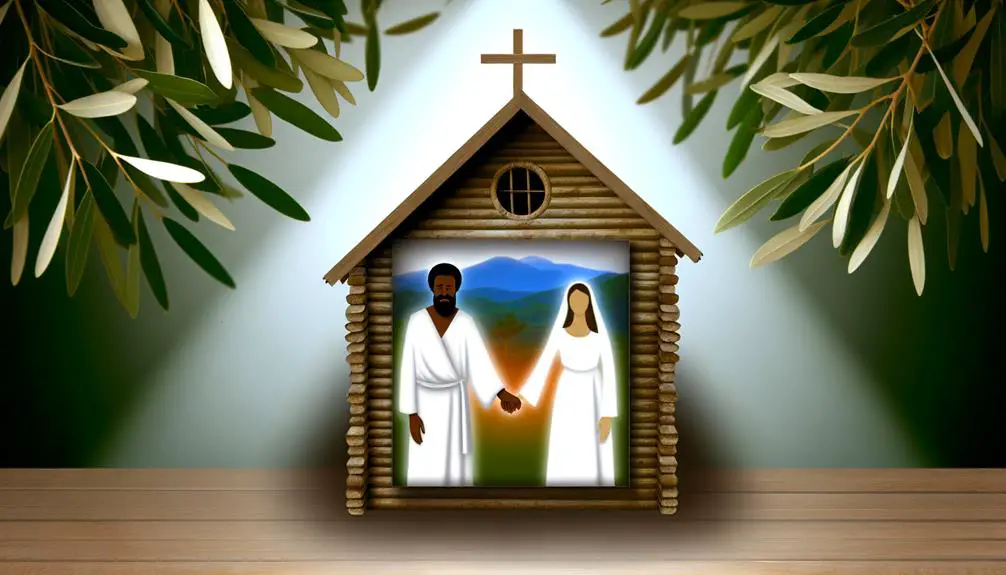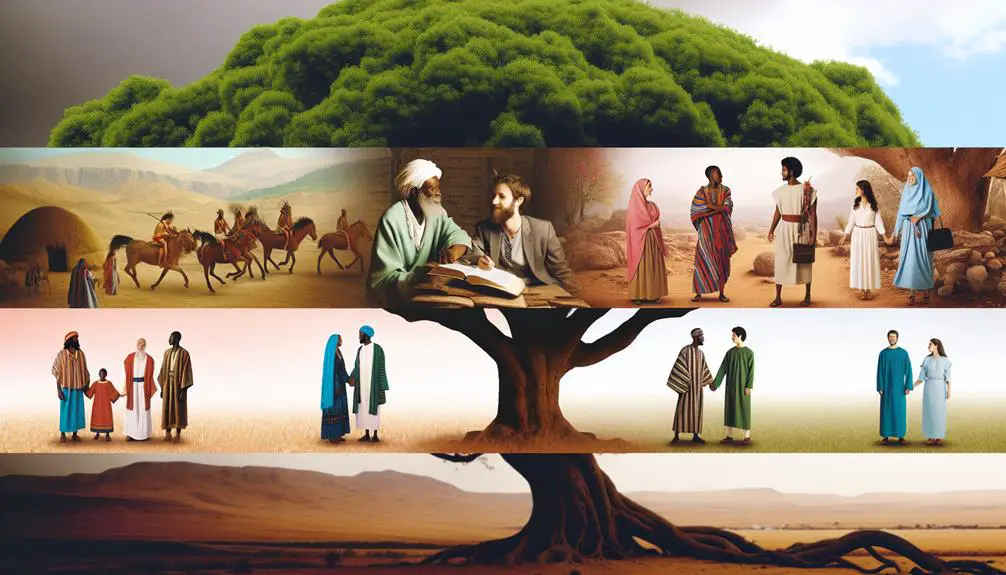From Genesis to Revelation, explore how monogamy's evolution in the Bible influences modern views on marriage—discover what lies between the lines.

Monogamy in the Bible
When you explore the sacred texts, you'll find that the path to lifelong companionship isn't always a straight line.
The Bible presents a complex tapestry of relationships, from the monogamous ideals echoed in the New Testament to the multiple partners of key Old Testament figures.
As you navigate through the Genesis of monogamy and the historical context of biblical relationships, you'll uncover how these ancient narratives shape our understanding of marriage laws, and the profound impact they've had on early Christianity.
The journey through these texts might just challenge your perceptions, sparking a curiosity to uncover more about the role of cultural influences on our interpretation of monogamy.
Key Takeaways
- Biblical teachings advocate for monogamy, emphasizing its spiritual significance and societal role.
- Historical and cultural contexts significantly influence the interpretation of monogamy in the Bible.
- Debates on celibacy versus marriage reflect diverse biblical perspectives on relationships.
- Contemporary discussions on biblical monogamy recognize the evolution of societal norms and encourage interpretative diversity.
The Genesis of Monogamy

Historically, the concept of monogamy emerges prominently within the early narratives of the Bible, reflecting a foundational aspect of societal norms and personal relationships. From an anthropological perspective, this adherence to monogamy can be seen as a reflection of evolving social structures and the establishment of more complex societal norms. Anthropologists argue that as societies evolved, the benefits of monogamous relationships became more apparent, leading to its endorsement in religious texts like the Bible.
Evolutionary theories also offer insights into why monogamy might've been favored in biblical times. These theories suggest that monogamy could have offered distinct evolutionary advantages, such as increased paternal certainty and more focused parental investment in offspring. This would have led to stronger, healthier progeny, thereby supporting the survival and continuity of early societies.
Thus, the Bible's emphasis on monogamy isn't merely a religious or moral dictate but reflects deeper anthropological and evolutionary underpinnings. It's a testament to how human relationships have been shaped by both societal needs and the inherent benefits that monogamy presented to early human communities.
Polygamy in the Old Testament
While the Bible underscores monogamy in numerous passages, it also presents instances of polygamy among key figures in the Old Testament, revealing complex societal and relational dynamics. The origins of polygamy in these ancient narratives often reflect not just personal choices but also broader social, economic, and political factors. For instance, the establishment and expansion of king's harems served multiple purposes beyond mere marital relations. These harems, often consisting of multiple wives and concubines, were instrumental in securing alliances, consolidating power, and ensuring the propagation of the royal lineage.
Analyzing these Old Testament narratives, you discern a world where polygamous practices were intertwined with the fabric of society. Despite the polygamous arrangements of patriarchs and kings, these stories are presented without explicit endorsement or condemnation, suggesting a nuanced view of marital practices in the context of their times. The depiction of polygamy, especially within royal contexts, highlights the pragmatic approach to marriage and relationships, where political strategy and social stability often took precedence over the ideal of monogamous unions.
In this light, the Old Testament's treatment of polygamy serves as a historical reflection rather than a theological endorsement, offering insight into the complexities of ancient societies.
The Role of Marriage Laws

You'll find that the marriage laws in the Bible establish a foundational framework for understanding monogamy. These laws not only define the legal aspects of marital unions but also reflect the cultural influences of the time.
Exploring these dimensions provides a comprehensive view of how biblical principles shaped the institution of marriage.
Biblical Marriage Foundations
Marriage laws in the Bible serve as foundational elements that structure the institution of marriage, guiding behaviors and relationships within a religious context. These laws not only establish the legal framework for marriage but also shape marriage customs and define spousal roles, ensuring a harmonious societal fabric.
Aspect |
Biblical Reference |
Impact on Marriage |
|---|---|---|
Marriage Customs |
Genesis 2:24 |
Sets precedent for union |
Spousal Roles |
Ephesians 5:22-33 |
Defines duties and respect |
Social Stability |
Proverbs 18:22 |
Highlights marital harmony |
Legal Aspects Defined
How do the laws outlined in the Bible specifically regulate the institution of marriage, thereby influencing societal norms and individual behaviors? The Bible's legal framework regarding marriage establishes clear guidelines that shape personal commitments and societal structures. These regulations extend beyond mere ceremonial aspects, embedding into the fabric of community life.
- Divorce regulations in the Bible set stringent criteria for dissolving marriages, aiming to protect the sanctity of the marital bond.
- Inheritance laws ensure the rightful distribution of assets, reinforcing family unity and stability.
- Provisions for the protection of widows and orphans safeguard the vulnerable, reflecting a compassionate societal ethos.
- Adultery laws underscore fidelity, imposing moral and sometimes legal consequences for violations.
- Levirate marriage laws aim to preserve family lineage and provide for those who might otherwise be left destitute.
These laws collectively foster a culture where marriage is revered, promoting a structured approach to relationships and family life.
Cultural Influences Explored
While the legal frameworks within the Bible meticulously define the institution of marriage, it's essential to consider the profound impact these laws have had on cultural norms and individual behaviors. Ancient practices, as outlined in biblical texts, played a pivotal role in shaping societal expectations and personal commitments within communities. These frameworks didn't just dictate legalities; they influenced moral values and social structures.
Modern comparisons reveal how these ancient guidelines have evolved but still resonate in contemporary discussions about marriage and monogamy. The transition from biblical times to today shows a dynamic interplay between tradition and adaptation. By examining these shifts, you gain insights into how deeply ingrained beliefs about marriage have guided, and continue to guide, societal norms and individual choices.
Jesus and the Monogamous Ideal

In examining the teachings of Jesus, one finds a clear endorsement of monogamous relationships as the ideal model for romantic partnerships. His life and sermons offer profound insights into the nature of such relationships, emphasizing their sacredness and exclusivity. Notably, Jesus' singleness itself presents a compelling narrative, illustrating a life devoted entirely to spiritual pursuits and the welfare of humanity, yet not devoid of teachings on marital fidelity and love. Furthermore, Jesus frequently employed marital metaphors to describe the relationship between God and His people, underlining the importance of faithfulness and unconditional love.
Consider these key points derived from Jesus' teachings and life:
- Jesus highlighted the sanctity and indissolubility of marriage, reinforcing the monogamous ideal.
- His use of marital metaphors illustrates the depth of commitment expected in relationships.
- Jesus' own singleness further underscores the value of personal commitment to spiritual and communal welfare.
- By focusing on the heart's purity, Jesus elevated the standards of love and fidelity beyond mere physical adherence.
- His teachings on divorce and adultery serve to protect the integrity of the marital bond, advocating for a return to original matrimonial ideals.
These elements collectively showcase Jesus' support for monogamy, rooted in love, respect, and an unwavering commitment to one's partner.
Paul's Letters on Marriage
Turning your attention to Paul's letters, you'll find nuanced perspectives on marriage that have significantly influenced Christian thought. His discourse provides guidelines on monogamy and presents a complex debate on the merits of celibacy versus marriage.
Analyzing these texts, you'll uncover how Paul's views contribute to the broader understanding of monogamous relationships within the biblical canon.
Paul's Marriage Guidelines
Paul's letters offer detailed guidelines on marriage, emphasizing its significance and the responsibilities it entails for both partners. His teachings provide a framework for understanding how marriages can thrive within a Christian context, focusing on mutual respect, love, and spiritual companionship. Here are key points from his guidance:
- Widow remarriage is addressed, emphasizing the importance of companionship and support within the faith community.
- Spiritual companionship is highlighted as a cornerstone of a successful marriage, encouraging partners to grow together in their faith.
- Mutual respect and love are mandated, with specific instructions for treating each other with kindness and patience.
- Paul advises against unequal yoking with non-believers, underscoring the potential for spiritual discord.
- The importance of resolving conflicts and maintaining unity within the marriage is stressed, with an emphasis on forgiveness and understanding.
Celibacy Versus Marriage Debate
Building on the foundation of marriage as outlined by Paul, one must also explore his nuanced views on celibacy and its place alongside marital commitments within Christian life. Paul's letters offer a comprehensive framework that balances the spiritual merits of celibacy with the sanctity of marriage. This balance is not only a theological directive but also intersects with secular perspectives and historical celibacy practices.
Aspect |
Marriage |
Celibacy |
|---|---|---|
Paul's View |
Sanctified union |
Higher calling |
Secular Perspectives |
Social stability |
Personal freedom |
Historical Celibacy |
Varied acceptance |
Spiritual devotion |
Modern Relevance |
Continues debate |
Inspires reflection |
Analyzing Paul's discourse, one finds a recognition of the complexities of human relationships. His letters suggest that the choice between celibacy and marriage is deeply personal, influenced by one's spiritual journey and societal context.
Monogamy in Proverbs and Songs

Exploring the texts of Proverbs and Songs reveals nuanced perspectives on monogamy, reflecting a complex interplay of cultural and religious values. These books, often attributed to Solomon, present monogamy not just as a marital structure but as a reflection of wisdom and moral fortitude. Through Solomon's allegories and wisdom poetry, one can discern a clear preference for the exclusivity and fidelity that monogamy entails.
- Solomon's allegories in Proverbs emphasize the importance of fidelity, often personifying wisdom as a faithful companion.
- Wisdom poetry in both Proverbs and Songs champions the virtues of love, loyalty, and the dangers of infidelity.
- Proverbs contrasts the righteous path with the folly of adultery, suggesting monogamy as a safeguard against moral decay.
- Songs celebrate the intensity and exclusivity of romantic love, arguably exemplifying the ideal of monogamous relationships.
- The texts collectively underscore a societal preference for monogamous unions, framed within the broader context of wisdom and moral living.
These scriptural segments underscore the Bible's complex stance on monogamy, woven into the fabric of its broader teachings on wisdom, love, and morality.
Historical Context of Biblical Relationships
To fully grasp the biblical perspective on relationships, it's crucial to delve into the historical context within which these narratives and laws were formed. The ancient Near East, a melting pot of cultures and traditions, provides a backdrop to the varied relationship dynamics observed in biblical texts. Archaeological evidence and genetic studies have been pivotal in understanding the familial structures and societal norms of this era.
Factor |
Influence on Biblical Relationships |
|---|---|
Archaeological Evidence |
Offers insights into the material culture, including household items and burial sites, shedding light on family life and practices. |
Genetic Studies |
Reveals patterns of patrilineality and matrilineality, suggesting the prevalence of certain marriage customs. |
Cultural Norms |
Indicates that polygamy was accepted among the elite, though not necessarily the standard among common people. |
Legal Texts |
Provides context for biblical laws on marriage, inheritance, and divorce, reflecting societal norms. |
Literary Analysis |
Helps decipher metaphors and narratives surrounding relationships, offering a deeper understanding of their significance. |
This exploration reveals that biblical relationship norms cannot be detached from their historical and cultural settings. Understanding these dimensions allows for a nuanced interpretation of biblical texts.
The Impact on Early Christianity

As you explore the impact of monogamy on early Christianity, you'll find that early church teachings significantly shaped believers' views on marriage. These teachings facilitated cultural shifts, leading to the widespread acceptance of monogamy as the norm.
Consequently, marriage norms within Christian communities were established, reflecting a departure from previous practices.
Early Church Teachings
The teachings of the early Church significantly shaped Christianity's understanding and practice of monogamy. These teachings, rooted in apostolic practices and Church governance, offered a framework that guided the moral and social behaviors of early Christians.
- *Apostolic practices* emphasized the importance of monogamy as a reflection of Christ's relationship with the Church.
- Early *Church governance* advocated for stable, monogamous marriages among its leaders and lay members.
- Texts and epistles from the period frequently addressed marital fidelity and the virtues of a monogamous life.
- Church councils and synods often debated and reinforced the expectations for monogamous unions.
- The teachings served as a counterpoint to the prevailing polygamous cultures surrounding early Christian communities, establishing a distinct identity.
These elements collectively influenced how early Christianity viewed and practiced monogamy, embedding it deeply within the faith's moral and ethical codes.
Cultural Shifts Embraced
Early Christianity's embrace of cultural shifts significantly influenced its stance on monogamy, reflecting evolving societal norms and theological interpretations. As the religion spread across diverse cultures, it encountered and gradually integrated various marriage rituals into its teachings, navigating the complex terrain of existing social structures.
This adaptation wasn't merely passive; it was a strategic move to make the Christian doctrine more accessible and appealing to a broader audience. The incorporation of local marriage customs helped bridge cultural gaps, yet it also challenged the church to confront and sometimes adopt social stigmas associated with non-monogamous practices.
Marriage Norms Established
Setting the stage for marital norms, early Christianity significantly reshaped societal views on monogamy through its teachings and practices. You'll find that the early church's approach to marriage ceremonies and divorce regulations played a pivotal role in establishing these norms.
- Marriage ceremonies became more than social contracts; they were imbued with spiritual significance.
- Divorce regulations were tightened, reflecting a commitment to lifelong union.
- Monogamy was promoted as the ideal model for Christian couples.
- Early teachings emphasized fidelity and mutual respect within marriage.
- The church acted as a moral and legal authority in marital disputes.
This framework not only shaped the religious landscape but also had a profound impact on the social fabric of early Christian communities, embedding monogamy deeply within Western cultural norms.
Cultural Influences on Interpretation

Understanding how cultural contexts shape interpretations of monogamy in the Bible requires a discerning examination of historical and contemporary viewpoints. Through translation analysis, you'll find that societal norms heavily influence how scriptures are understood and taught. Ancient societies, with their diverse practices around marriage, have passed down interpretations that vary significantly. These interpretations have been further shaped by the translators' own cultural backgrounds, leading to a complex layering of meaning over the original texts.
Societal norms, especially regarding gender roles and family structures, play a crucial role in how monogamy is viewed through the biblical lens. In cultures where polygamy was prevalent, biblical narratives were often seen in a different light compared to societies strictly practicing monogamy. This divergence highlights the importance of considering the historical context in which the Bible was written and subsequently interpreted.
Moreover, the evolution of societal norms over time has led to reevaluations of biblical texts related to monogamy. As societies evolve, so do their understandings and applications of these ancient teachings. This ongoing dialogue between the past and present ensures that interpretations of monogamy in the Bible remain a dynamic and complex topic.
Modern Perspectives on Biblical Monogamy
Contemporary discussions on biblical monogamy challenge traditional interpretations, urging a reevaluation of its role and significance within modern Christian practice. As you delve into these modern perspectives, it's vital to consider how societal evolution and the recognition of psychological benefits have influenced the discourse.
- Societal Evolution: Understand how societal changes have shifted the perception of monogamy from a biblical mandate to a choice reflective of personal and spiritual commitment.
- Psychological Benefits: Acknowledge the psychological advantages of monogamous relationships, such as emotional stability and security, which align with Christian values of love and fidelity.
- Interpretative Diversity: Explore how various Christian denominations now interpret biblical texts on monogamy differently, allowing for a broader understanding of relational ethics.
- Cultural Contextualization: Recognize the importance of contextualizing biblical teachings on monogamy within contemporary cultures, which often hold diverse views on relationships.
- Educational Approaches: Consider the role of Christian education in discussing monogamy, emphasizing the need for open, informed dialogues that reflect modern societal values and scientific understanding.
These perspectives invite a nuanced consideration of biblical monogamy, encouraging a more inclusive and adaptable approach within Christian communities today.
Frequently Asked Questions
How Do Modern Archaeological Findings Influence Our Understanding of Monogamous Versus Polygamous Practices in Ancient Biblical Times?
Modern archaeological findings, through advanced dating methodologies and rigorous checks for artifact authenticity, significantly shape your understanding of ancient practices. These discoveries offer concrete evidence, allowing you to discern patterns and societal norms of the era, including relationship structures.
As a result, you're better equipped to analyze the historical prevalence of monogamous versus polygamous practices, moving beyond speculative interpretations to a more grounded understanding of ancient social dynamics.
Are There Specific Biblical Figures Who Defied the Prevailing Marital Norms of Their Times, and What Were the Consequences, if Any, Detailed in the Scriptures?
When exploring figures who challenged marital norms, you'll find instances of both marital fidelity and divine retribution.
For example, King David's affair with Bathsheba led to grave consequences, showcasing a departure from marital faithfulness and ensuing divine punishment.
Similarly, Solomon's numerous wives deviated from expected norms, resulting in divine displeasure.
These narratives illustrate the complex interplay between personal actions and their perceived spiritual repercussions in historical texts.
How Do Non-Canonical Texts or Apocryphal Writings Address the Concept of Monogamy or Polygamy, and Do They Offer a Contrasting Viewpoint to the Canonical Bible?
You'll find that non-canonical texts delve into marriage concepts differently, highlighting the diversity of early Christian thought. Specifically, Gnostic perspectives often present a contrasting viewpoint to the canonical Bible, particularly around Apocryphal marriages.
These texts sometimes suggest more fluid interpretations of relationships than the strict monogamy seen in mainstream scriptures. This approach sheds light on the broader spectrum of beliefs within early Christian communities, offering a rich tapestry of theological thought.
In Biblical Narratives, How Are the Emotional and Psychological Impacts of Monogamy Versus Polygamy on Individuals and Families Portrayed, if at All?
You're exploring how narratives depict the emotional and psychological effects of monogamy versus polygamy. These stories often reflect on marital satisfaction and how societal norms shape individual experiences.
While some narratives may highlight the complexities and challenges of polygamous arrangements, others underscore the stability and emotional fulfillment found in monogamous relationships.
This analysis shows how personal contentment and societal expectations intertwine, influencing the portrayal of family dynamics and individual well-being.
How Have Interpretations of Biblical Monogamy and Polygamy Evolved in Different Christian Denominations, and What Are the Theological Justifications for These Evolving Interpretations?
You might think Christian denominations stick closely to ancient texts, but when it comes to monogamy and polygamy, interpretations have significantly evolved due to cultural influences and modern adaptations.
Different denominations have developed varied theological justifications for these changes, analyzing biblical narratives with a contemporary lens. This evolution showcases a dynamic engagement with scripture, reflecting a blend of tradition and adaptation to societal shifts.
Conclusion
In conclusion, you've navigated through the intricate tapestry of monogamy and polygamy within the Bible, from its genesis to modern interpretations.
Remember, 'the more things change, the more they stay the same.' Despite evolving cultural and societal norms, the foundational aspects of biblical relationships, underscored by monogamy, continue to influence contemporary Christian ideals.
Analyzing these ancient texts reveals not just historical practices but also a mirror reflecting our ongoing quest for understanding human connections in a scholarly and objective light.



Sign up